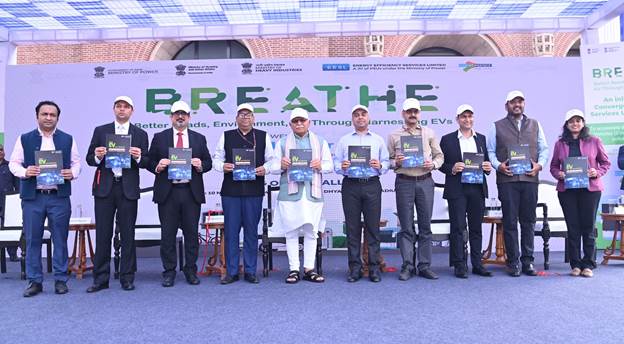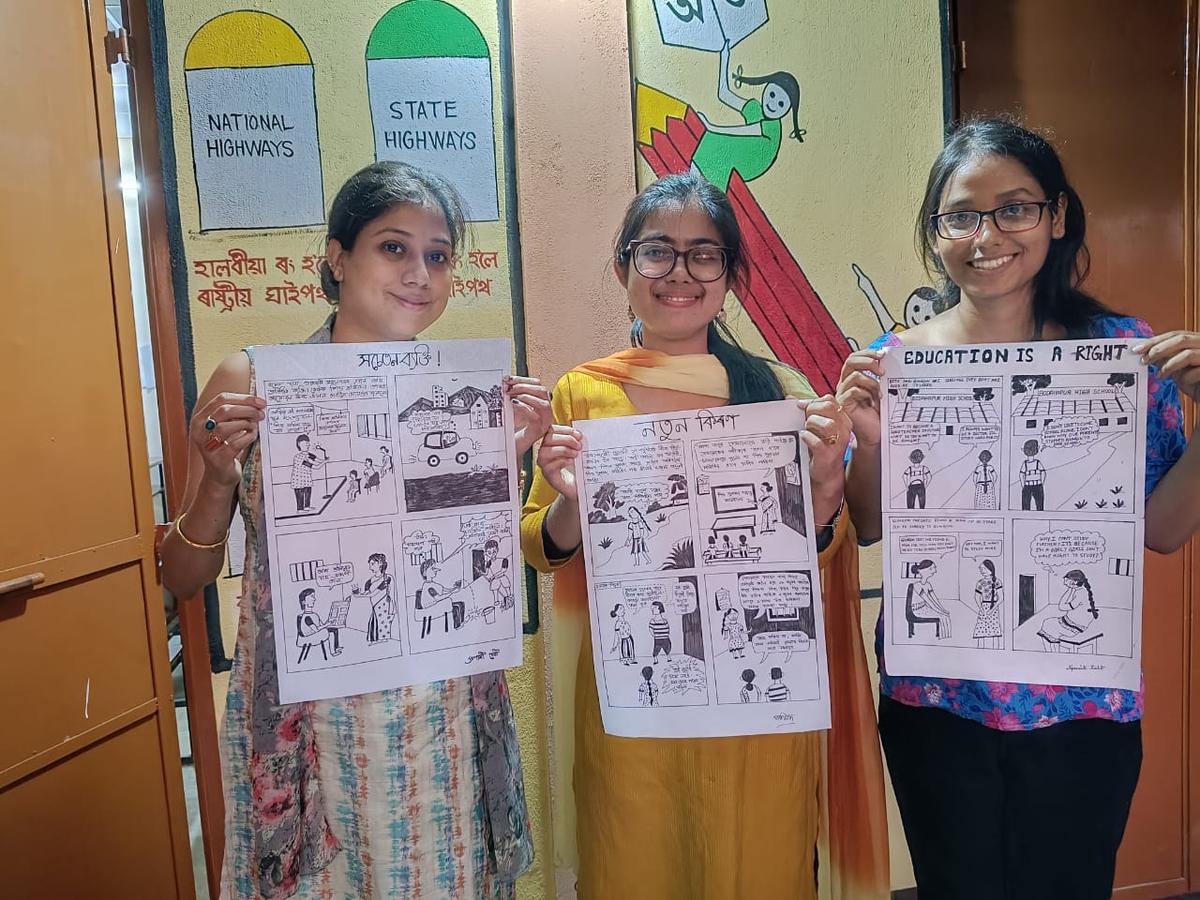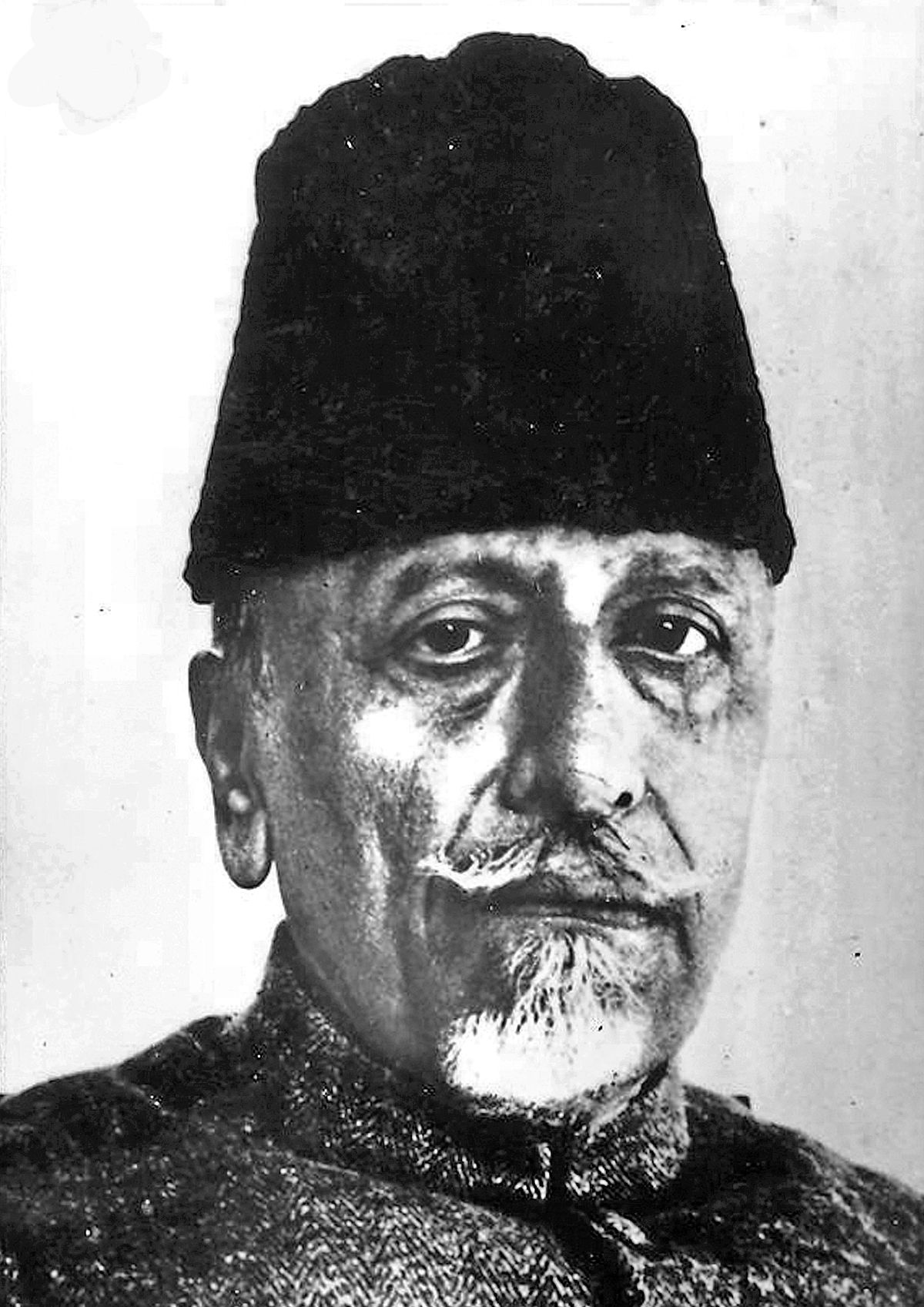EV as a Service Programme

- 11 Nov 2024
In News:
- The 'EV as a Service'programme was launched by Shri Manohar Lal, Union Minister of Power and Housing & Urban Affairs, at the Major Dhyan Chand National Stadium.
- The initiative is spearheaded by Convergence Energy Services Limited (CESL), a subsidiary of Energy Efficiency Services Limited (EESL), to promote electric vehicles (EVs) in government offices.
Objective:
- The 'EV as a Service'programme aims to boost e-mobility within the government sector by deploying 5,000 electric cars in central and state government ministries, public sector enterprises (CPSEs), and various institutions over the next two years.
- The programme is designed to support India’s net-zero emissions goal by 2070 and advance the country's environmental sustainability vision.
Flexible Procurement Model:
- The programme utilizes a flexible procurement model, allowing government offices to choose from a range of E-Cars based on operational needs, making it adaptable for different government departments.
- It will help in reducing the reliance on fossil fuels, cutting carbon emissions, and contributing to energy security.
CESL’s Contribution:
- CESL has already deployed 2000 electric cars across India and is working on deploying around 17,000 electric buses.
- The 'EV as a Service'programme is a key step in helping India transition to clean mobility and reducing emissions from government fleets.
Alignment with National Initiatives:
- The launch complements the PM E-DRIVE Scheme, which aims to accelerate India’s transition to electric mobility.
- Vishal Kapoor, MD & CEO of CESL, emphasized that the initiative is helping to create a collaborative ecosystem involving manufacturers, fleet operators, policymakers, and users to scale up electric mobility in India.
Comics Commandos in Assam

- 11 Nov 2024
In News:
- "Comics Commandos" is an innovative initiative launched in Goalpara district, Assam, aimed at combating child labour and child marriage through the creative medium of comics.
- The initiative trains 30 local youths to create comic strips that use humour and minimal text for effective communication and public engagement.
Purpose and Objectives:
- Primary Goal: To raise awareness about child labour and child marriage, two major social issues prevalent in the region, by using visual storytelling.
- The initiative aims to resonate with the local community, focusing on everyday struggles like economic hardship, child abuse, and the social norms that perpetuate these issues.
- Rising Dropout Rates: Assam has witnessed an increase in school dropout rates, from 3.3% in 2020-21 to 6.02% in 2021-22, exacerbated by economic pressures like poverty, which force children to work or marry early.
Execution and Approach:
- Training: Thirty local youths are trained to design caricatures and doodles for the comics, ensuring the messages are both simple and engaging for a broader audience.
- Visual Storytelling: The use of visuals over text helps overcome literacy barriers and makes the message more impactful and accessible.
- Community Involvement: The program collaborates with teachers and school committees to facilitate wider participation and support in creating social awareness.
Government Support:
- Chief Minister HimantaBiswaSarma initiated a state-wide campaign in 2023 against child marriage, with the ambitious goal of eradicating it by 2026. This initiative aligns with the state's broader efforts to address social issues.
Impact of the Initiative:
- Comics Commandos is being seen as an effective tool for community empowerment and awareness generation in a region that faces persistent social challenges.
- By involving local youths in the campaign, the initiative ensures community participation and ensures that the message is communicated in a culturally relevant manner.
- The program also empowers young people to use their creativity for social change, thus helping build leadership and social responsibility among the youth.
Arpactophiluspulawskii
- 11 Nov 2024
In News:
- Arpactophiluspulawskii, a new species of aphid wasp, was discovered in Nagaland (Khuzama district), marking the first record of the genus Arpactophilus outside Australasia.
- This significant discovery highlights the biodiversity of Northeastern India, a region known for its rich and unexplored fauna.
Importance of Discovery:
- The Zoological Survey of India (ZSI) researchers cataloged the species, marking a major range expansion for the genus Arpactophilus, previously only found in Australasia, including regions like New Caledonia.
- The discovery expands the genus’s known distribution by thousands of kilometers, suggesting ecological connections between Nagaland and the Australasian region.
Species Characteristics:
- Arpactophiluspulawskii is distinguished by its square-shaped head, an inverted V-shaped uplifted clypeus, and rust-colored body markings.
- It features a uniquely textured thorax, setting it apart from other species in the genus.
- The wasp was collected from an altitude of over 1,800 meters, indicating Nagaland’s ecological diversity at high altitudes.
Ecological Significance:
- The Arpactophilus genus is known for its unique nesting behavior: females use silk from their abdomen to create protective cells in old termite galleries or mud nests.
- The discovery suggests that Nagaland’s ecological conditions (e.g., high altitude, diverse habitat) support the presence of such specialized fauna, making the region an important site for entomological research.
Taxonomic Contribution:
- The species is named Arpactophiluspulawskii in honor of Dr. Wojciech J. Pulawski, a distinguished expert in wasp taxonomy.
Scientific and Research Implications:
- The discovery is expected to stimulate further entomological research in Northeastern India, especially in areas like Nagaland, which are often overlooked in global biodiversity studies.
- Researchers believe that this discovery could lead to the identification of other unknown species in the region, expanding our understanding of species distribution and the ecological connectivity between regions.
Parliamentary Panel's Review on Mechanism to Curb Fake News

- 11 Nov 2024
In News:
- The Parliamentary Panel on Communications and Information Technology is reviewing mechanisms to curb fake news, following the Bombay High Court striking down a provision of the amended Information Technology (IT) Rules, 2021.
- The controversial provision allowed the government to identify and flag "fake news" on social media through its Fact Check Unit (FCU).
- The panel, led by BJP MP Nishikant Dubey, has summoned representatives from News Broadcasters and Digital Association and the Editors Guild of India to discuss the issue on November 21, 2024.
Issue with the Amended IT Rules:
- The IT Rules, 2021 were amended in April 2022 to include “government business” under the definition of fake news, expanding the scope of content flagged by the FCU.
- This amendment was challenged by media bodies and individuals like comedian Kunal Kamra, leading to the Bombay High Court striking it down in 2024.
- The court deemed the provisions unconstitutional, citing concerns about transparency and the potential misuse of power.
Types of Fake News:
- Misinformation: False information spread unintentionally.
- Disinformation: Deliberately false information meant to deceive and cause harm.
Status of Fake News in India:
- India as a major spreader of misinformation: The World Economic Forum's Global Risks 2024 report identifies disinformation as a significant short-term risk, with India as one of the largest consumers and producers of false information.
- Social Media Influence: Platforms like Facebook, WhatsApp, Twitter, and YouTube are widely used in India for news dissemination, making them a breeding ground for fake news.
- Spread of Political and Religious Misinformation: Fake news often serves political or religious agendas, leading to societal polarization and conflict.
Government Efforts to Combat Fake News:
- IT (Intermediary Guidelines and Digital Media Ethics Code) Amendment Rules, 2023: This amendment expanded the scope of "fake news" to include “government business” and gave the FCU the authority to flag misleading content.
- Press Information Bureau (PIB) Fact Check Unit: The PIB continues to run a fact-checking initiative, but it lacks the authority to remove flagged content from social media platforms.
- Digital Literacy Campaigns: Programs like Pradhan Mantri Gramin Digital Saksharta Abhiyan (PMGDISHA) aim to improve digital literacy, especially in rural areas, to help citizens identify and avoid fake news.
National Education Day 2024

- 11 Nov 2024
In News:
National Education Day is celebrated annually on November 11 to honor the birth anniversary of Maulana Abul Kalam Azad, India's first Education Minister and a prominent freedom fighter, scholar, and educator.
Key Highlights:
- Establishment:
- The observance was instituted by the Ministry of Human Resource Development (now Ministry of Education) in 2008 to recognize Azad’s pivotal contributions to India’s education system and his vision for a progressive, educated society.
- Azad's Contributions to Education:
- Azad played a significant role in shaping India's post-independence educational landscape, establishing critical institutions such as:
- University Grants Commission (UGC)
- All India Council for Technical Education (AICTE)
- Indian Institutes of Technology (IIT), including IIT Kharagpur
- Indian Council for Cultural Relations (ICCR)
- Promoted scientific research, cultural institutions, and technical education.
- Azad played a significant role in shaping India's post-independence educational landscape, establishing critical institutions such as:
- Significance of National Education Day:
- Reflects India’s commitment to promoting quality and inclusive education.
- Emphasizes the importance of education in empowering individuals and fostering national progress.
- Highlights educational reforms, literacy, and equal access to education as tools for societal transformation and empowerment.
- Theme for 2024:
- Although not officially published yet, the theme is expected to focus on inclusive, high-quality education, underlining the need for educational systems that equip students with skills to thrive in a rapidly evolving world.
- Focus Areas:
- Promoting literacy, equal access to education, and educational reforms.
- Developing critical thinking, creativity, and emotional intelligence in students.
